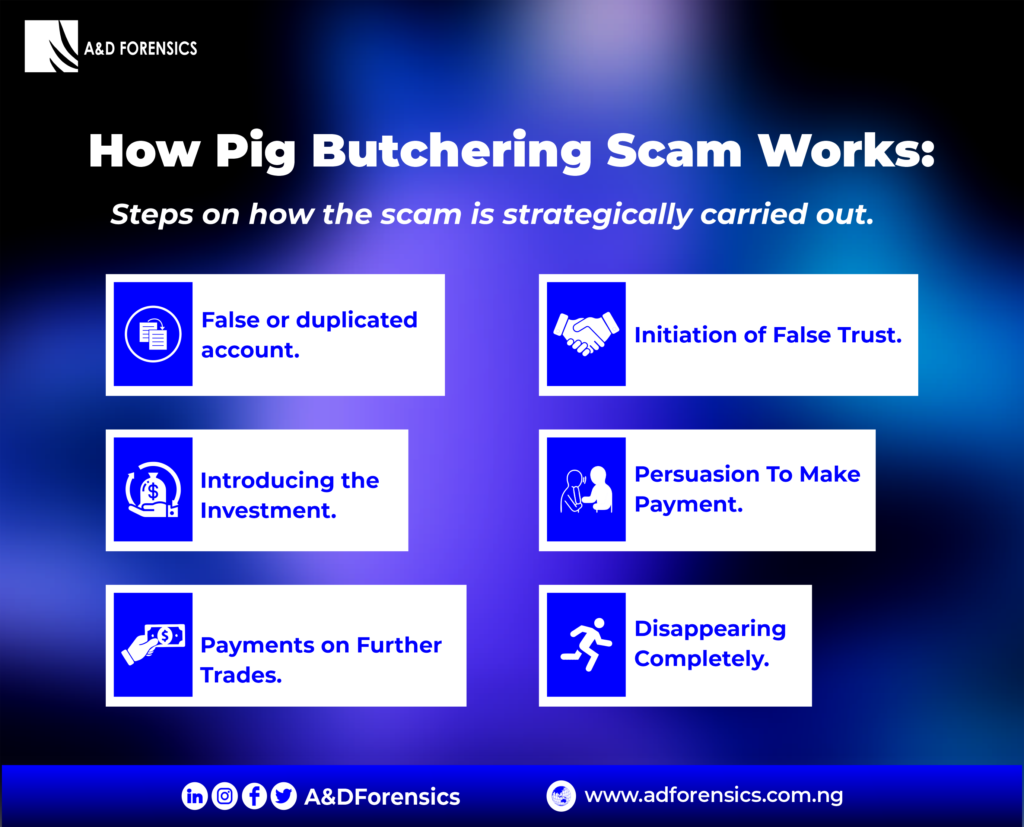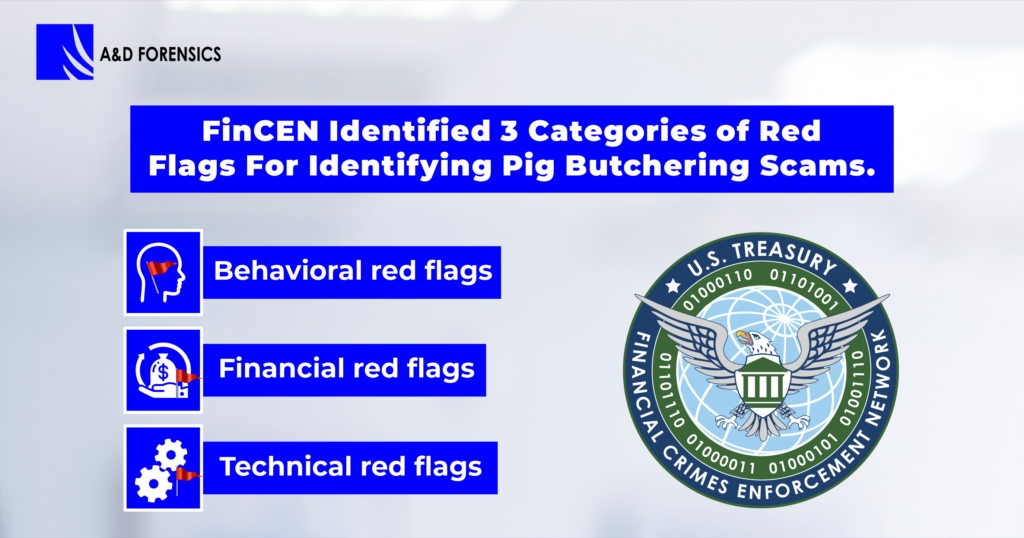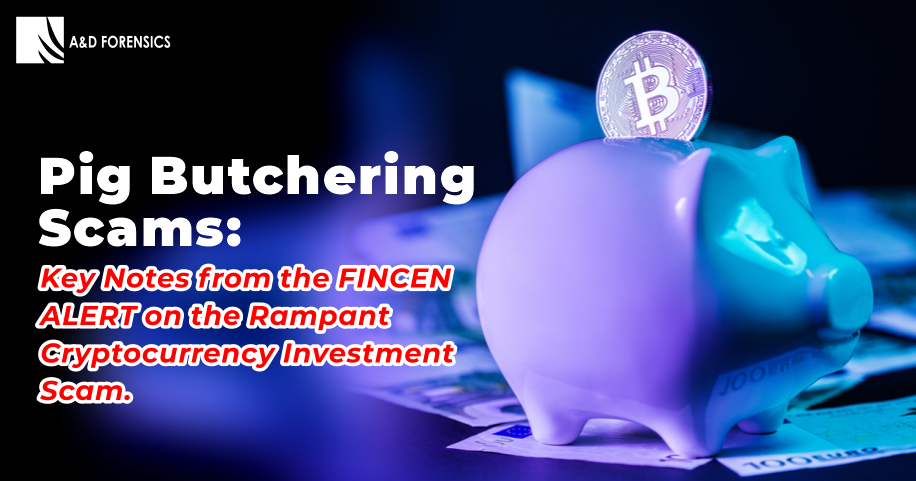Pig Butchering Scams are becoming rampant and in order to address this, the Financial Crimes Enforcement Network (“FinCEN”) issued an alert on September 8, 2023. This article discusses the 15 “red flags” provided by FINCEN for compliance officers of financial institutions (FIs) to consider while trying to detect, mitigate and report suspicious activities related to pig butchering scams. As a cryptocurrency enthusiast or user, you will also find this article insightful as it exposes the tactics involved in pig-butchering scams and teaches you how to protect yourself.
What are Pig Butchering Scams?
“Pig butchering scams” refer to a type of scam in which scammers manipulate and deceive individuals, referred to as “pigs” in this context, by using fake identities, fake relationships, and elaborate stories to gain their trust and “fatten them up” emotionally or financially, and eventually “slaughter” or scam them. It is a type of fraudulent activity that lures individuals or potential victims into investing their money into false investment schemes which are seemingly legitimate and profitable.
Tactics for pig butchering scams
Pig butchering scams frequently occur when scammers entice you as a victim with small initial investments designed to build your trust. These scams typically employ deceptive claims or forged dashboards displaying unrealistically rapid asset growth, all aimed at encouraging victims to make progressively larger investments.
According to FINCEN, scammers may communicate with victims using: Instant messaging services and text messages; Professional networking sites ;Social media; or Dating sites.

Here is how Pig Butchering Scam plays out:
- False or Duplicated account: First, the scammer initiates a fake account profile to reach out to you with random messages through social media or by spamming you with unwanted messages.
- Initiation of False Trust: At this stage, the scammer tries to stay in regular conversations with you to gain your trust and probably try to convince you to have confidence in them.
- Introducing the Investment: Once the scammer attains your trust, he/she will introduce you to promising investment schemes. These investment schemes can be in the form of stocks, cryptocurrency or any other investment asset.
- Persuasion To Make Payment: At this stage, the scammer will frequently alter convincing language to persuade you not to miss out on the promising investment.
- Payments on Further Trades: As soon as they gained your trust and have invested, the scammer will initiate a first profit to convince you. Then, the scammer will ask you for further payment to earn more profits.
- Disappearing Completely: As soon as you reinvest your profits and you’re hopeful to get bigger returns, the scammer will shut down the investment scheme making it impossible for you to withdraw your profits. At this point, the scammer disappears and you won’t be able to contact them again.
FinCEN-Identified Red Flags for Identifying Pig Butchering Scams
FinCEN has provided the following indicators to help compliance officers of financial institutions to detect potential pig butchering scams. These red flags serve as warning signs to help detect potential cryptocurrency-related scams or illicit activities.

Behavioural Red Flags
- A customer who has never used or dealt with virtual currency before suddenly tries to exchange a large sum of regular currency from their bank account for virtual currency or makes substantial transfers to virtual currency service providers (VASPs).
- A customer is interested in an investment that promises big profits, but he/she heard about it from someone they didn’t know who contacted them online or through text message.
- A customer says he/she was told by someone they recently met that they should go to a virtual currency kiosk, exchange their regular money for virtual currency there, and then deposit that virtual currency at an address provided by this person.
- The customer displays anxious behavior to access funds quickly for cryptocurrency investment opportunities.
Financial Red Flags
- A customer makes an unusual withdrawal of his/her entire savings account and sends the funds to a Virtual Asset Service Provider (VASP) or buys cryptocurrency.
- A customer makes large cryptocurrency deposits followed by a substantial outgoing transfer in larger amounts.
- When inactive accounts with a lot of money in them suddenly start making unusual and frequent withdrawals of large sums of money. These withdrawals are either sent to a virtual currency service provider (VASP) or converted into virtual currency.
- A customer repeatedly sends electronic fund transfers (EFTs) or wire transfers to a virtual currency service provider (VASP) or moves some of his/her money from an account or wallet they have with a VASP claiming that these transactions are for “taxes,” “fees,” or “penalties.”
- A customer who initially made several small electronic fund transfers (EFTs) to a virtual currency service provider (VASP) suddenly stops doing that. Instead, the customer starts sending large wire transfers to accounts belonging to holding companies, limited liability corporations, and individuals he/she has never dealt with before. This behavior suggests that the customer might have been testing the waters with small transactions before potentially falling victim to a scam and sending larger amounts.
Technical Red Flags
- System monitoring and logs show that a customer’s account is being accessed multiple times from unusual places, using different devices, or unique identification information that doesn’t match their usual login patterns. This can indicate a potential security concern or unauthorized access to the account.
- If a customer talks about investing in virtual currency through a service, and that service’s website or app has lots of spelling mistakes, bad grammar, unreliable customer reviews, or looks unprofessional and poorly designed, it could be a sign that the service is not legitimate or trustworthy.
- When a customer talks about going to a website or using an app that claims to be linked to a real virtual currency service or investment business, but that website or app has red flags like misspelled web addresses, recently registered domains, no physical address, international contact details, or only provides chat or email for communication, it’s likely a sign of potential fraud or a scam.
- If a customer says they installed an app on their phone from a website that isn’t an official app store like Google Play or the Apple App Store, it could be risky. It’s safer to download apps from well-known, reputable sources or the app store that came with your device.
- When a customer receives a big amount of virtual currency, like ether, in a cryptocurrency exchange, and then quickly changes it into another virtual currency with lower transaction costs, such as TRX (Tron), and promptly sends it out of the exchange.
Comparing pig butchering scams to romance scam
The FinCEN alert on pig butchering scams can be compared to romance scams because in romance scams, the scammer must win over the victim’s trust in order to persuade them to make a fraudulent investment.
According to the Federal Bureau of Investigations (FBI), “Romance scams occur when a criminal adopts a fake online identity to gain a victim’s affection and trust. The scammer then uses the illusion of a romantic or close relationship to manipulate and/or steal from the victim.”
In pig butchering scams, scammers aim to gain the victim’s trust, similar to romance scams, but their approach is different. They often claim to be investors or money managers, presenting themselves as legitimate professionals involved in financial opportunities. Pig butchering scams have a more financial or investment-oriented deception, where victims are induced into making fraudulent investments or financial transactions. The emphasis is on gaining trust through the guise of financial expertise.
Romance scams are frequently on dating websites and the Match Makers app. Scammers pose as people they are not in order to meet their intended victim and then bombard them with stolen images, love poems, and romantic songs in an effort to gain their trust and receive money.
While both scams involve trust-building, pig butchering scams are distinct in that they portray the scammer as a financial professional, further legitimizing the fraudulent operation. Additionally, pig butchering scams may initiate contact through professional networking sites or other means, as mentioned in the provided content.
In summary, romance scams primarily exploit emotions and romantic connections, while pig butchering scams use a financial or investment angle to gain trust and deceive victims.
How To Avoid Becoming a Pig Butchering Scam Victim:
- Conduct Thorough Research: Always investigate any cryptocurrency investment opportunities presented to you.
- Beware of Unknown Contacts: Refrain from responding to unknown phone numbers and phishing emails.
- Learn about Cryptocurrencies: Learn how it works and understand the risks involved with investing in cryptocurrencies before you invest.
- Don’t disclose your personal information to strangers that you meet online.
- Verify Website URLs: Before investing, especially in cryptocurrency, verify that the official website URL matches the recommended site. Be cautious of misspelled URLs resembling legitimate ones.
- Do Your Due Diligence: Research all investment opportunities thoroughly and be wary of get-rich-quick schemes.
- Check App Legitimacy: Before downloading any app, ensure it is legitimate. Beware of pig butchering scam apps that may appear in official app stores.
CONCLUSION
The rapid growth of pig butchering scams and their detrimental effects on their victims provide reason to be attentive and wary of the fraudsters’ methods. Individuals must constantly be on the lookout for any pig butchering scams because con artists are continually coming up with advanced techniques to con their victims.
With the red flags issued to the compliance officers of financial institutions, these professionals will be able identify and thwart fraudulent activities. By staying informed about the red flags associated with pig butchering scams, these officers can effectively detect and prevent any attempts at financial fraud. Their vigilance is crucial in safeguarding the financial interests of their institution and its clients. It is advisable to take a step back and examine whether you are a potential victim or if suspicious of red flags listed by the FinCEN can report to any liable compliance officers, if you find yourself in any kind of relationship with someone you met online and who has signs of pig butchering scams, you can reach out to A&D Forensics
Knowing the dangers posed by pig butchering scams, and other investment frauds operating online is essential, as is knowing when to break off such partnerships.






